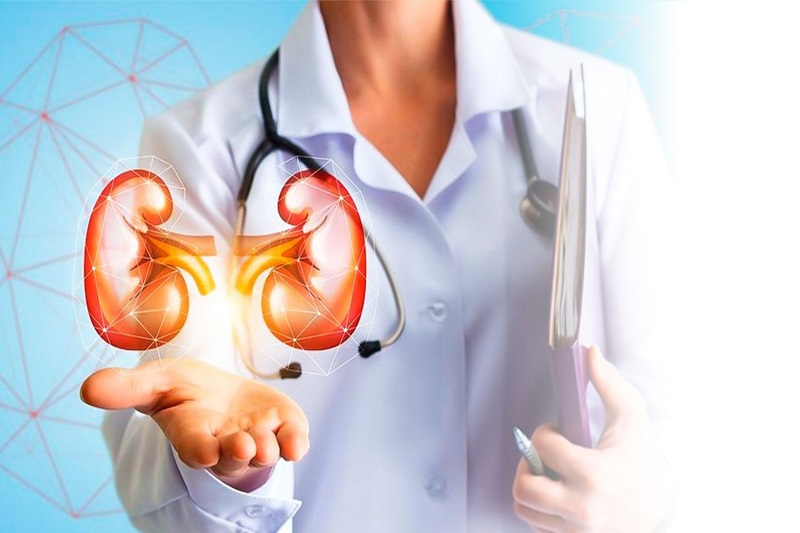Kidney Transplant In Lucknow, Uttar Pradesh (UP)
Kidney or renal transplantation is the process of transplanting a kidney to a patient with end-stage kidney disease. Kidney transplantation is classified as deceased-donor or living donor transplantation depending upon the source of the donor. Living-donor transplantation is further classified as genetically related or unrelated transplants, depending on the biological relationships between the donor and recipient. Apollomedics has the best facilities in Lucknow, Uttar Pradesh.
A kidney receiver (recipient) generally needs one kidney but in some rare cases, the patient may receive two kidneys from a deceased donor. The infected or diseased kidneys are mostly left in their places and a new kidney is placed in the lower abdomen.
Kidney Transplant Helpline – +91-9599514875
How does the kidney work?
Our body only takes nutrients from the food we eat and converts them into energy. After consuming all the nutrients the waste products are left behind in the blood and bowel.
The kidneys and urinary system consume chemicals such as potassium and sodium remove the waste called urea from our body and maintain an acid-base balance. We have a detailed guide on how kidneys function.
The kidneys are located below the ribs and their functions are:
- Remove liquid waste from the blood
- Maintain a balance of acid and base in our blood
- Produce erythropoietin (a hormone that helps the formation of RBC)
- Regulate blood pressure
Nephrons are the filtering unit for urea from the blood in our kidneys. Urea and water together make urine and pass through the urinary tract.
Investigations before kidney transplant
- Blood Tests: To access your priority on the donor list and to help improve chances of organ acceptance.
- Diagnostic Tests: These are performed to assess the overall health status and kidneys. The tests include X-rays, ultrasound, kidney biopsy and dental examination. Women may have to undergo Pap tests, gynaecology evaluations and mammograms.
Steps before kidney transplant
The following are the steps involved:
-
- It starts with a well-explained conversation with a nephrologist and kidney transplant surgeon; they explain each and every aspect and will allow you to clear all your queries.
- You have to sign a consent form that gives permission to doctors to perform surgery. Read carefully and ask unclear things.
- If you are in routine dialysis, you will have to undergo another dialysis before transplant.
- If you are prepared for a living transplant, you have to be on fast for 8 hours before operation. In the case of a cadaver transplant, the recipient has to be on fast after getting notified that the kidney is available.
- To help you relax, you may get a sedative.
- Other preparations may be done on the basis of your physical and medical conditions.
During the procedure
Before a kidney transplant, you have to stay in the hospital for one day. The procedure may depend on your physician’s practice.
Generally, a kidney transplant specialist follows the following steps:
- You will be approached to take off attire and given an outfit to wear.
- An intravenous (IV) line will be begun in your arm or hand. Further catheters might be implanted in your neck and wrist to screen the status of your heart and pulse, just as for acquiring blood tests. Substitute sites for the extra catheters involve the subclavian (under the collarbone) region and the groin.
- The hairs in the surgical area will be removed.
- A catheter will be implanted into your bladder.
- You will be situated on the surgical table, lying on your back.
- The procedure will be performed while you are snoozing under general sedation. A tube will be inserted through your mouth into your lungs and attached to a ventilator which will start working as your lungs to breathe.
- The anesthesiologist will persistently screen your heart rate, pulse, breathing, and blood oxygen level during the operation.
- The skin over the surgical site will be wiped with an antiseptic.
- The surgeon will make an incision in the lower abdomen on one side.
- The surgeon will examine the kidney of the donor visually.
- The donor kidney will be set into the abdomen. A left donor kidney will be inserted on your right side; a right donor kidney will be embedded on your left side. This permits the ureter to be examined simply for linking with your bladder.
- The renal artery and vein of the donor kidney will be sutured (sewn) to the outer iliac artery and vein.
- After the artery and vein are joined, the blood flow through these will be checked for bleeding at the suture lines.
- The donor ureter (the tube that channels urine from the kidney) will be attached to your bladder.
- The incision will be closed with staples or stitches.
- The discharge may be implanted to the incision site to reduce swelling.
- A dressing will be applied.
After the procedure
After the operation, you will be shifted to observation. Once your blood pressure, pulse, and breathing come under control and become stable then you will be shifted to the intensive care unit (ICU) or room in the hospital. Kidney transplant patients have to stay several days to a week in the hospital for monitoring.
In the case of a cadaver kidney transplant, a kidney may take a bit longer to produce urine and may require dialysis but in living donors, the kidney starts producing urine immediately.
A catheter will be placed in the bladder to drain the urine and measure urine production and kidney function effectively.
You will receive IV fluids until you are able to take sufficient quantities of food.
Immunosuppressants (anti-rejection medications) will be given with other medications and closely monitored to optimize them.
Your blood samples will be frequently taken to monitor the kidney function and other organs like the liver for the effect on it.
You can walk several times in a day from the very next day of the procedure (not in bedridden situation).
Take medications for pain relief as prescribed by physicians only.
All the included departments like dietician, nursing, physical therapist and others will instruct how to take care of and recover rapidly.
After going home if you feel any of the below symptoms, report to your physician at the earliest:
- Fever – may be a sign of rejection or infection.
- Redness, swelling or bleeding from the incision area.
- Increased pain near or over the incision are – may be a sign of rejection or infection.
Doctor’s Profile

Prof. Amit Gupta

Dr. Jony Agarwal

Dr. Shashikant Gupta

Dr Shailendra Gupta

Dr. (Maj) Sujeet Shekhar Sinha

Dr Mayank Mohan Agarwal

Dr (Col) Anannya Dutta

Dr Arpit Srivastava




